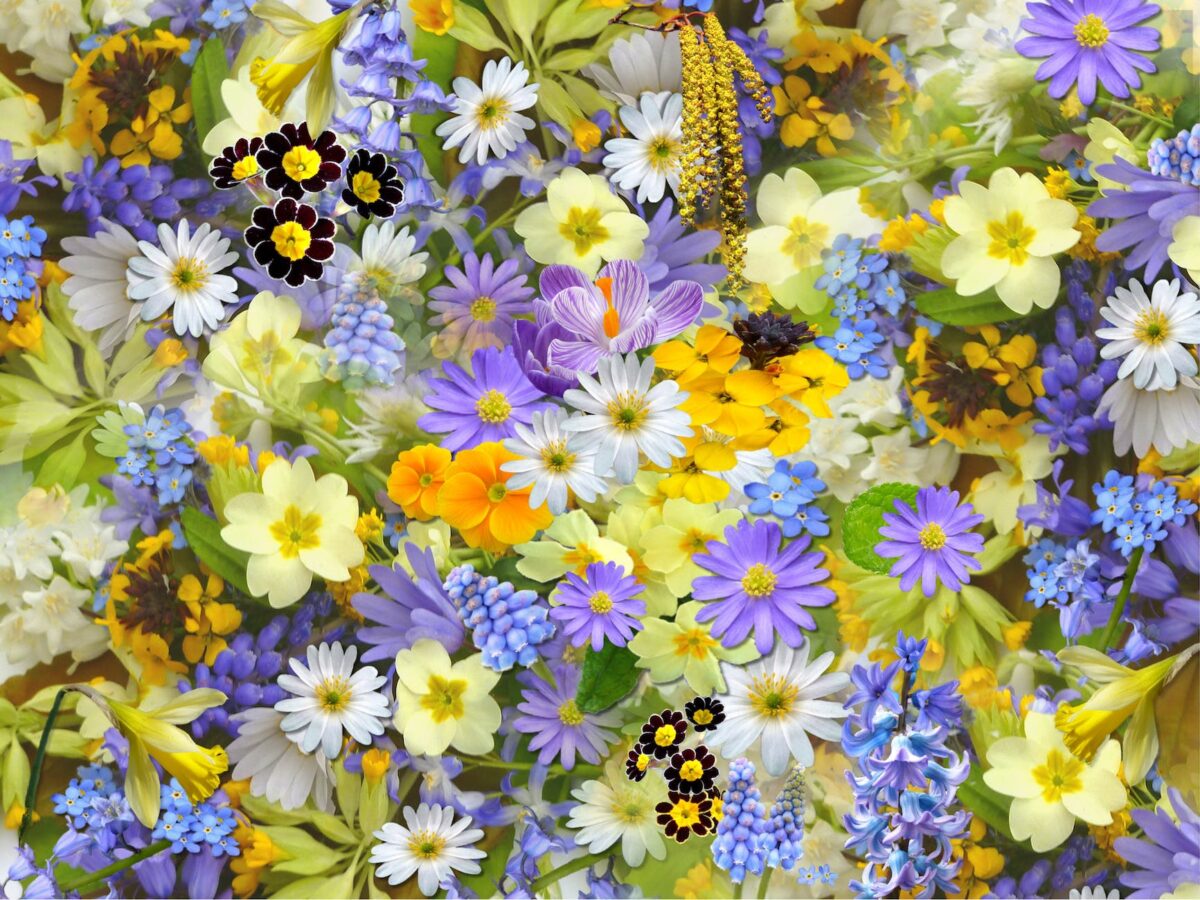법구경
4. 꽃의 장
Pupphavaggo
Flowers
한글.빠알리.영어 대역
한글번역: 도신
영문번역: Buddharakkhita
44. 누가 이 땅과 신들의 세상
그리고 염라의 세상을 구별할까?
누가 꽃을 잘 아는 이처럼
바르게 가르친 진리의 말을 분별할까?
Ko imaṃ pathaviṃ vicessati yamalokañca imaṃ sadevakaṃ
Ko dhammapadaṃ sudesitaṃ kusalo puppham iva pacessati
Who shall overcome this earth,
this realm of Yama and this sphere of men and gods?
Who shall bring to perfection the well-taught path of wisdom
as an expert garland-maker would his floral design?
* 염라 또는 염라대왕은 우리가 익히 알듯 죽음 직후 인간의 삶을 심판하는 신이다.
45. 배움의 제자가 이 땅과 신들의 세상
그리고 염라의 세상을 구별하고
배움의 제자가 꽃을 잘 아는 이처럼
바르게 가르친 진리의 말을 이해할 것이다.
Sekho pathaviṃ vicessati yamalokañ ca imaṃ sadevakaṃ
Sekho dhammapadaṃ sudesitaṃ kusalo puppham iva pacessati.
A striver-on-the path shall overcome this earth,
this realm of Yama and this sphere of men and gods.
The striver-on-the-path shall bring to perfection
the well-taught path of wisdom,
as an expert garland-maker would his floral design.
46. 이 몸을 물거품처럼 알고
환영 같은 그 본성을 완전히 깨닫는 이는
마라의 꽃 화살을 끊어
죽음의 왕이 보지 못하는 곳으로 가리라.
Pheṇūpamaṃ kāyamimaṃ viditvā marīcidhammaṃ abhisambudhāno
Chetvāna mārassa papupphakāni adassanaṃ maccurājassa gacche.
Realizing that this body is like froth,
penetrating its mirage-like nature,
and plucking out Mara’s flower-tipped arrows of sensuality,
go beyond sight of the King of Death!
47. 집착하는 마음으로
욕망의 꽃을 따는 사람을
홍수가 잠든 마을을 휩쓸듯이
죽음은 잡아서 끌고 간다.
Pupphāni heva pacinantaṃ vyāsattamanasaṃ naraṃ
Suttaṃ gāmaṃ mahoghova maccu ādāya gacchati.
As a mighty flood sweeps away the sleeping village,
so death carries away the person of distracted mind
who only plucks the flowers (of pleasure).
48. 집착하는 마음으로
꽃을 따는 사람은
욕망에 결코 만족함이 없이
죽음으로 끝이 난다.
Pupphāni heva pacinantaṃ vyāsattamanasaṃ naraṃ
Atittaṃ yeva kāmesu antako kurute vasaṃ.
The Destroyer brings under his sway
the person of distracted mind who,
insatiate in sense desires,
only plucks the flowers (of pleasure).
49. 벌이 꽃의 모양과
향기를 해치지 않고
꿀만 따서 떠나듯
수행자도 그처럼 마을을 다녀야 한다.
Yathāpi bhamaro pupphaṃ vaṇṇagandham aheṭhayaṃ
Paleti rasamādāya evaṃ gāme munī care.
As a bee gathers honey from the flower
without injuring its color or fragrance,
even so the sage goes on
his alms-round in the village.
50. 남들의 허물 또는 남들이 한 일,
하지 않은 일들을 보지 말고
단지 자신이 한 일,
하지 않은 일들 만을 바라보라.
Na paresaṃ vilomāni na paresaṃ katākataṃ
Attanova avekkheyya katāni akatāni ca.
Let none find fault with others;
let none see the omissions and commissions of others.
But let one see one’s own acts, done and undone.
51. 아름답지만 향기 없이
보기만 좋은 꽃같이
이처럼 좋은 말을 하면서
실천하지 않는 자에게 결실이 없다.
Yathāpi ruciraṃ pupphaṃ vaṇṇavantaṃ agandhakaṃ
Evaṃ subhāsitā vācā aphalā hoti akubbato.
Like a beautiful flower full of color
but without fragrance,
even so, fruitless are the fair words of one
who does not practice them.
52. 그 모습이 아름답고
향기마저 좋은 꽃같이
이처럼 좋은 말을 하면서
실천하는 이에게 결실이 있다.
Yathāpi ruciraṃ pupphaṃ vaṇṇavantaṃ sagandhakaṃ
Evaṃ subhāsitā vācā saphalā hoti sakubbato.
Like a beautiful flower full of color
and also fragrant,
even so, fruitful are the fair words of one
who practices them.
53. 꽃의 무더기에서
많은 꽃다발을 만들 수 있듯
이처럼 태어나 죽는 사람은
좋은 일을 많이 해야 한다.
Yathāpi puppharāsimhā kayirā mālāguṇe bahū
Evaṃ jātena maccena kattabbaṃ kusalaṃ bahuṃ.
As from a great heap of flowers
many garlands can be made,
even so should many good deeds
be done by one born a mortal.
54. 꽃향기는 바람을 거슬러 가지 못하고
전단, 향나무, 말리꽃의 향도 그러하지만
선한 사람의 향기는 바람을 거슬러 가고
참 사람의 향기는 온 곳으로 퍼져 나간다.
Na pupphagandho paṭivātam eti na candanaṃ tagaramallikā vā
Satañ ca gandho paṭivātam eti sabbā disā sappuriso pavāti.
Not the sweet smell of flowers,
not even the fragrance of sandal, tagara,
or jasmine blows against the wind.
But the fragrance of the virtuous blows against the wind.
Truly the virtuous man pervades all directions
with the fragrance of his virtue.
55. 전단과 향나무
연꽃과 자스민 등
향기 나는 것들 중 최고는
계행의 향기이다.
Candanaṃ tagaraṃ vāpi uppalaṃ atha vassikī
Etesaṃ gandhajātānaṃ sīlagandho anuttaro.
Of all the fragrances—sandal,
tagara, blue lotus and jasmine—
the fragrance of virtue is the sweetest.
56. 향나무와 전단의
그 향기는 미약하지만
계행을 지키는 이의 향기는 으뜸으로
신들 사이를 퍼져 간다.
Appamatto ayaṃ gandho yāyaṃ tagaracandanī
Yo ca sīlavataṃ gandho vāti devesu uttamo.
Faint is the fragrance of tagara and sandal,
but excellent is the fragrance of the virtuous,
wafting even amongst the gods.
57. 계행을 갖추고
성실히 살아가며
바른 앎으로 해탈한 이들의 길을
마라는 알지 못한다.
Tesaṃ sampannasīlānaṃ appamādavihārinaṃ
Sammadaññā vimuttānaṃ māro maggaṃ na vindati.
Mara never finds
the path of the truly virtuous,
who abide in heedfulness
and are freed by perfect knowledge.
58. 큰 길의 버려진
쓰레기 더미에서
맑은 향기로 마음을 기쁘게 하는
연꽃이 필 수 있듯이
Yathā saṃkāradhānasmiṃ ujjhitasmiṃ mahāpathe
Padumaṃ tattha jāyetha sucigandhaṃ manoramaṃ.
Upon a heap of rubbish
in the road-side ditch blooms a lotus,
fragrant and pleasing.
59. 이와 같이 보통 사람인
눈먼 쓰레기 같은 존재들 가운데
바른 깨달음을 얻은 이의 제자는
지혜로 밝게 빛난다.
Evaṃ saṃkārabhūtesu andhabhūte puthujjane
Atirocati paññāya sammāsambuddhasāvako.
Even so, on the rubbish heap of blinded mortals
the disciple of the Supremely Enlightened One
shines resplendent in wisdom.


답글 남기기